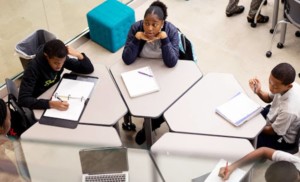Better Tools and Better Schools
We ask teachers to do an impossible job: take 25 or 30 kids with learning levels that varies by five years or more, boost every student’s learning by more than one year’s worth in about 170 days, and make sure the lowest achieving kids pass an end of year test so that they can progress to the next grade.
Now, most states are raising standards by adopting Common Core Standards with the goal of preparing all students for college and careers. And we’re asking teachers to ‘personalize instruction’ to meet the needs of every student. Impossible just got more difficult.
A few thousand district and charter schools serving low income students help most of them achieve state standards through a longer day and year and heroic effort by teachers. Regular testing and some basic reporting tools give teachers some periodic information to gauge progress and tailor efforts, but it’s still a brute force effort.
We have to make it easier for teachers and schools to be successful.
Teachers are starting to get some help from a new generation of learning games with instant performance feedback and smart curriculum that customizes the experience for every learner.
Schools are expanding their offerings with online learning—instruction and content delivered primarily over the Internet. Learning online is bigger than charter schools and growing by more than 30% annually. Kids learning online at traditional schools is the biggest category. Where state policy allows it, any student can gain access to any advanced course, any foreign language, or just a different way to learn algebra.
The International Association of K-12 Online Learning (I’m a director) held their annual conference this week and released an updated introduction to online learning this week. They also released a state-by-state update of progress.
Online learning is providing quality options for students and is promoting the development of new tools for schools and teachers. Online learning platforms are making traditional schools better by making good teachers great teachers—they identify and meet the needs of individual students allowing each to move at his/her own pace.
The Digital Learning Council, chaired by Governors Jeb Bush and Bob Wise, is a group of 80 education and policy leaders that met online for the last three months talking about the tools and schools that will make good teachers great teachers. The Digital Learning Now recommendations for state policy makers will be released December 1.
Digital learning will make it easier for teachers and schools to be successful.






0 Comments
Leave a Comment
Your email address will not be published. All fields are required.